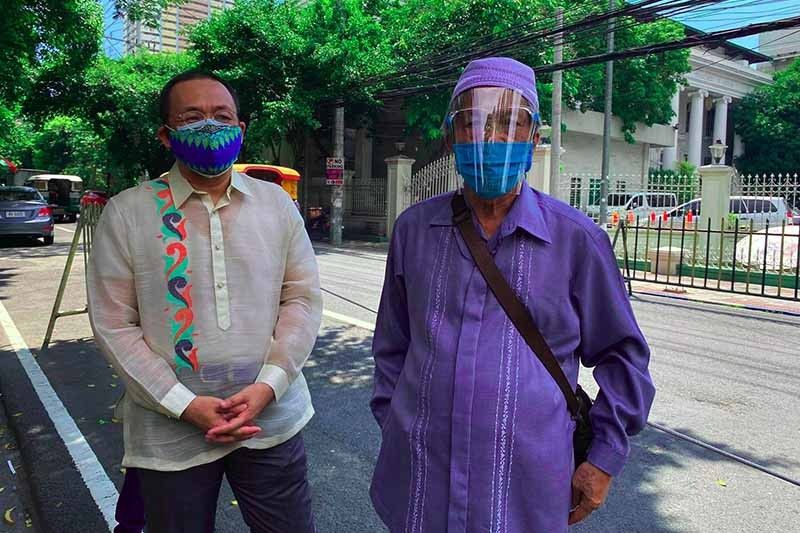Citing prejudice against their communities, Moro lawyers join fight against anti-terrorism law at SC

MANILA, Philippines — Four lawyers from the Bangsamoro region, whose continuing history is rife with struggles against terrorism, filed the 15th petition against the Anti-Terrorism Act of 2020.
Lawyers Algamar Latiph, Batuas Lucman, Musa Malayang and Dalomilang Parahiman on Thursday filed a Petition for Certiorari asking the Supreme Court to strike down 14 sections of Republic Act 11479 or the ATA as unconstitutional.
This is the 15th petition against the law. This means that, as of Thursday, the anti-terrorism law is facing the same number of petitions as the widely criticized Cybercrime Prevention Act of 2012.
In making their case, the Moro lawyers acknowledged that while the intention of RA 11478 is commendable, it has provisions that undermine public welfare and safety.
“We, as Bangsamoro, Muslims, and natives of Mindanao, have been at the heart of the struggle against terrorism. The destruction of Marawi is a living testament [to] the atrocities of terrorism. We are most affected. We were forced out of our homes, our relatives displaced, abused, or murdered,” they said in their petition.
The Moro lawyers said that they, too, want nothing but peace, but they stressed that to achieve this, laws meant to fight terrorism must be constitutional, “so that innocent people are [protected]; so that terrorism is effectively suppressed; so that terrorists are punished; and, so that justice and rule of law prevailed.”
“But with the passage of the Anti-Terrorism Act, the Sword of Damocles hangs over the head of the ordinary Filipino citizen especially the Muslims. And the verbal assurances of the government cannot guarantee that no abuses in its enforcement shall be committed,” they added.
RELATED: Duterte: I have no agenda to kill Moros
Prejudice and mistaken identity
The petition asserted that, under the law, a suspected terrorist may be detained for 24 days, as prescribed in Section 29 of the law, and thus be denied due process. This, they said, violates the equal protection clause.
Muslims are at a bigger risk of violations, the lawyers said, citing historical and contemporary prejudice against them.
They recalled that in 2013, then-Interior Secretary Mar Roxas uttered the phrase “Muslim na mananakop (Muslim invaders)” in referring to the siege of Zamboanga City by a faction of the Moro National Liberation Front associated with its founding chairman Nur Misuari.
They said that Roxas, despite his stature and education, is not alone in being prejudiced against Muslims.
The lawyers said that SC jurisprudence dating back to the colonial era referred to the Moro people as having “barbarous and savage customs” and an “absolute lack of education and culture.”
In the recent case of People of the Philippines vs. Gilbert Sibelleno, promulgated January 13, 2020, the SC, through Justice Marvic Leonen, said:
Just because a community outside of Mindanao is predominantly Muslim does not mean that it should be considered presumptively "notorious." It is this type of misguided, unfortunately uneducated cultural stereotype that has caused internal conflict and inhuman treatment of Filipinos of a different faith from the majority.
These instances would show “arbitrariness in the determination of ‘suspected person,’” the Moro lawyers said.
“Section 29 is not a mere abstract assembly of words. When it operates in the real world: It can put innocent men and women into jail based on personal preference, stereotyping, and prejudiced of arresting and detaining officers without legal accountability for a period of 24 days,” they said.
During the Zamboang Siege, law enforcers arrested 285 persons. Seven of them turned out to be children and were released only on August 2014. Upon reinvestigation, 42 were released for lack of evidence on March 2015. Seven also died in detention.
“From 285 accused in 2013, it was now reduced to 65,” they said.
The lawyers also cited dozens of cases of mistaken identity involving Moros. “It is also a manifestation of systematic arrest and detention of innocent Bangsamoro and gross disregard of constitutional rights to liberty and personal security,” they said.
“It is also yields an evidence on the recklessness of law enforcers in their arrests and in fictitiously charging innocent Bangsamoro. This pattern of repeated and series of mistaken identity, the prejudice, the stereotype, and delegated power of the military and police officer to determine who are suspect under Section 29, has made the application of the RA 11479 uneven thereby violative to the equal protection clause,” the Moro lawyers added.
- Latest
- Trending




























